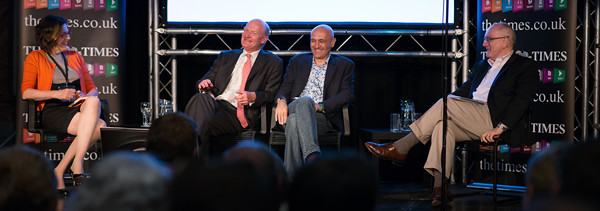Willetts at Cheltenham on science funding

This year’s Cheltenham Science Festival was co-directed by David Willetts, the UK’s Minister for Universities and Science. On Thursday evening, we attended the ‘Science, the Economy and You’ panel discussion hosted by Vivienne Parry, featuring Willetts; physicist and broadcaster Jim Al-Khalili; and Jack Walters, Vice-President for External Medical Affairs at Pfizer.
The opening remarks by Willetts set the scope for discussion, and were based on a thought experiment, asking the audience to imagine they were ‘beady-eyed Treasury officials’ deciding how to distribute public spending. To convince the hypothetical Treasury workers to look favourably on science and research, he made five key arguments:
- Science (a term which, he stressed, included the social sciences and arts) is an inherently worthwhile pursuit.
- The scientific efforts of our forebears are responsible for our contemporary quality of life, so we should boost research so that future generations will be even better off.
- Science and technology are symbiotic: by funding the former, we can boost the latter, which will feed back into better research.
- International investment is mobile, so the government should show commitment to the research base in order to make the UK an attractive destination for foreign firms.
- Funding will grow and maintain the ‘absorptive capacity’ of British scientists to make use of scientific developments in other countries.
However, these arguments clearly aren’t wowing the Treasury: the UK science budget is both unstable, and set to diminish. As Al-Khalili observed in his opening remarks, ‘many scientists would argue that ring-fencing the budget isn’t enough’, and expressed concern about the future of the UK’s position as ‘second only to America’, as other nations ramp up investment. Long-term vision is needed for science funding; an issue eloquently summarised by Walters, who noted that ‘diseases do not respect electoral cycles’.
However, Willetts suggested that the upside of our ever-shifting science budget is agility. He encouraged the audience to imagine making a commitment for holiday spending within a household budget. For example, if you hope to go on a £1500 trip each year, it makes more sense to only earmark £1000 per year, with extra discretionary holiday money available if cash-flow allows.
Unfortunately, this metaphor isn’t particularly helpful. Firstly, there is a well-known disanalogy between household budgeting and national budgeting (for example, a countercyclical food shopping policy would see you spending more at the supermarket to compensate for your sudden unemployment). Further, if the science budget depends on ‘flexible’ windfalls as it does now, this makes for an uncertain environment for everyone from research-heavy firms to individual scientists, who may leave the UK, or find an alternative and more stable career. While holidays might be ‘discretionary’, scientists’ mortgage repayments tend not to be. As Al-Khalili put it, ‘a small cut in funding can have further detrimental effects…on confidence, and how countries and companies see Britain as a destination for investment.’
(Finally, as an aside, a family of four budgeting £1500 annually on holidays could probably afford to travel slightly less extravagantly, invest £250 of their discretionary £500 in research—and this would more than double their contribution to the UK science budget.)
Willetts is often held in high regard by scientists because, in Al-Khalili’s words, he ‘gets it’ when it comes to supporting scientific research. He does articulate strong arguments for science, but he also equivocates when pressed on making the case for a relative increase to the Treasury: ‘Any government, whatever their political philosophy, at some point needs to be straight about [the fact] that they can do X, not Y, and A, not B…’
If you’re trying to work out whether Willetts really does ‘get it’ when it comes to science funding, one crucial question remains: what would he do if he were one of those beady-eyed Treasury officials, weighing up his five arguments, and deciding what to do with the science budget?
Whilst it’s great to hear the Science Minister familiar with the arguments for science spending, we still can’t help but feel that the debate over science funding is framed in the wrong way: senior ministers and the Treasury are looking at how to tweak the status quo, rather than taking a step back, and pitting the research budget against the scale of the problems science is trying to solve. We hope that Mr Willetts, the Coalition, other politicians and the public might consider the Scienceogram’s way of thinking about it.